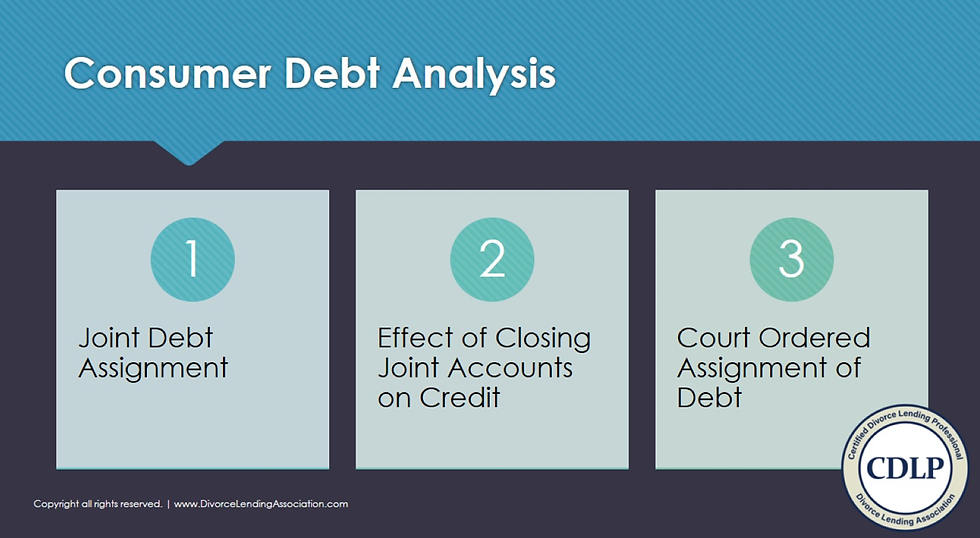
EQUAL CREDIT OPPORTUNITY RIGHTS
Navigating Your Credit Score Through Divorce
Divorce is a challenging process, and amidst the emotional turmoil, it's crucial to consider the financial implications, particularly your credit score. Here's how divorce can impact your credit and what steps you can take to safeguard it:
-
Joint Debt Assignment: In many marriages, couples accumulate joint debts such as mortgages, car loans, or credit card debt. During divorce proceedings, these debts must be assigned to one or both parties. However, even if the court assigns the debt to your ex-spouse, if your name is still on the account, you could be held responsible for any missed payments, affecting your credit score.
-
Effect of Closing Accounts on Credit: Closing joint accounts might seem like a logical step to separate finances, but it can impact your credit score. Closing accounts reduces your available credit and can increase your credit utilization ratio, which may lower your credit score. Additionally, if your ex-spouse fails to make payments on joint accounts that remain open, it could still negatively affect your credit.
-
Court-Ordered Assignment of Debt: In some cases, the court may order one spouse to take on specific debts as part of the divorce settlement. While this legally separates your financial obligations, creditors are not bound by divorce decrees. If your ex-spouse fails to pay the assigned debts, creditors can still come after you, potentially damaging your credit.
How a Divorce Mortgage Planning Report Can Help:
Navigating the complexities of divorce and its impact on your credit can be daunting. A Divorce Mortgage Planning Report can provide valuable insights into your credit situation. This report typically includes:
-
Detailed analysis of joint debts and their implications on your credit score.
-
Recommendations for separating joint accounts or refinancing options to minimize credit risks.
-
Strategies for protecting your credit during and after divorce proceedings.
If you're going through a divorce or considering one, don't overlook the importance of understanding and protecting your credit score. Contact us today to learn more about how a Divorce Mortgage Planning Report can help you navigate this challenging time and secure your financial future. Don't let divorce derail your credit—take proactive steps to safeguard it now.
.png)

When You Apply for Credit, Creditors May Not...
Discourage you from applying or reject your application because of your race, color, religion, national origin, sex, marital status, age, or because you receive public assistance.
Impose different terms or conditions, like a higher interest rate or higher fees, on a loan based on your race, color, religion, national origin, sex, marital status, age, or because you receive public assistance.
Ask if you’re widowed or divorced. A creditor may use only the terms: married, unmarried, or separated.
Ask about your marital status if you’re applying for a separate, unsecured account. A creditor may ask you to provide this information if you live in “community property” states. A creditor in any state may ask for this information if you apply for a joint account or one secured by property.
Ask for information about your spouse, except: if your spouse is applying with you; if your spouse will be allowed to use this account; if you are relying on your spouse’s income or on alimony or child support income from a former spouse; if you live in a community property state.
Ask if you get alimony, child support, or separate maintenance payments, unless they tell you first that you don’t have to provide this information if you aren’t relying on these payments to get credit. A creditor may ask if you have to pay alimony, child support or separate maintenance payments.




A Special Note to Women
A good credit history often is necessary to get credit. This can hurt many married, separated, divorced, and widowed women. Typically, there are two reasons women don’t have credit histories in their own names: either they lost their credit histories when they married and changed their names, or creditors reported accounts shared by married couples in the husband’s name only.
If you’re married, separated, divorced, or widowed, contact your local credit reporting companies to make sure all relevant bill payment information is in a file under your own name.
National credit reporting companies sell the information in your report to creditors, insurers, employers, and other businesses that, in turn, use it to evaluate your applications for credit, insurance, employment, or renting a home.


Take Action
If you suspect a creditor has discriminated against you:
Complain to the creditor.
Check with your state Attorney General’s Office to see if the creditor violated state equal credit opportunity laws.
Report violations to the appropriate government agency. If you’ve been denied credit, the creditor must give you the name and address of the agency to contact.
CONTACT US today for your divorce mortgage planning!





